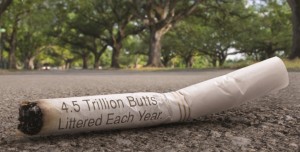Butts on the Beach
This past weekend, while stuck in traffic for 20 minutes, I noticed four different people throw 6 cigarette butts out the widow and onto the highway. That, and the fact that I am lazy, moved me to re-post something I wrote several years ago.
Recently a columnist in a local Southeastern Connecticut newspaper wrote about the things that bug him when driving. It included the usual gripes that we all have—people driving slowly in the passing lane, failure to use turn signals, merging on the highway with little consideration of the traffic already on the highway, able-bodied people parking in handicapped designated spaces and so on. One thing missing from the list was my pet peeve: people who throw cigarette but ts out the window. Much to my wife’s and adult kids’ humiliation, whenever I see someone do it, I honk the horn and politely suggest that they use the ashtray in their car. For the most part my yelling out the window is not heard, or it’s greeted as though I’m some lunatic who they would do best to avoid. In the few cases when the message gets through, I’m either ignored or greeted with one half of a peace sign.
ts out the window. Much to my wife’s and adult kids’ humiliation, whenever I see someone do it, I honk the horn and politely suggest that they use the ashtray in their car. For the most part my yelling out the window is not heard, or it’s greeted as though I’m some lunatic who they would do best to avoid. In the few cases when the message gets through, I’m either ignored or greeted with one half of a peace sign.
According to Keep America Beautiful, Americans are smoking fewer cigarettes than ever before, yet cigarette butts continue to be the most commonly littered item in the United States and around the world today, with tobacco products comprising 38% of all U.S. roadway litter.
Cigarette butts thrown out a car  window often travel through the stormwater system and end up on the beach. The problem is that the butt (filter) part of the cigarette isn’t really biodegradable. The filter is made from strings of cellulose acetate (a plastic) that are packed tightly together. Estimates of how long butts take to decompose range from 18 months to never. They are designed to filter out some of the toxins, such as tar, found in cigarette smoke. When thrown on the ground and then swept through the storm sewer system into local surface waters, they leach these toxins into the environment.
window often travel through the stormwater system and end up on the beach. The problem is that the butt (filter) part of the cigarette isn’t really biodegradable. The filter is made from strings of cellulose acetate (a plastic) that are packed tightly together. Estimates of how long butts take to decompose range from 18 months to never. They are designed to filter out some of the toxins, such as tar, found in cigarette smoke. When thrown on the ground and then swept through the storm sewer system into local surface waters, they leach these toxins into the environment.
To make matters worse, most new cars don’t come with ashtrays. You have to pay extra to get them as part of a “smoker’s package.” It costs between $20 and $40. I’m sure that the automobile manufacturers had noble intentions when making the decision to eliminate ashtrays. Perhaps they thought by making it inconvenient, people would smoke less. Since smoking in a car can significantly reduce its resale value, they are looking out for their customer’s financial well-being. Whatever the case, not having an ashtray in your car would seem to increase the possibility that the butt is going out the window.
My efforts have been rewarded with a few successes. Like the time outside a bar when I told a woman she shouldn’t throw their butt in the gutter. She responded by saying I was right, crushed the butt out and put it in a nearby trashcan. But I really can’t think of many others over the 4 or so years I’ve been doing this. I’d like to think that some smokers, upon reflection, do consider the effect of cigarettes on the environment after I bring it to their attention. If more people spread the message then maybe more smokers will get the word about the problem they are creating by tossing cigarette butts on the ground.
So what can you do? Well, that is really up to you. My first attempt at writing this blog had many helpful suggestions about how to respond to people you see littering. When my wife read it she muttered something about my mental health and, despite my inclusion of a disclaimer, suggested I rethink what I was recommending. So, with that advice, I’m simply going to say that I hope that you will take whatever steps you feel comfortable with when you see someone litter. Besides, the Keep America Beautiful website has some excellent examples of strategies that cities have adopted to reduce cigarette butt litter by an average of 54%. But, I’m still including the disclaimer.
Disclaimer: Use common sense when addressing this issue. Don’t get into an argument with someone or precipitate an incident of road rage. It’s important to let people who litter know it’s not OK, but not at the risk of an altercation.